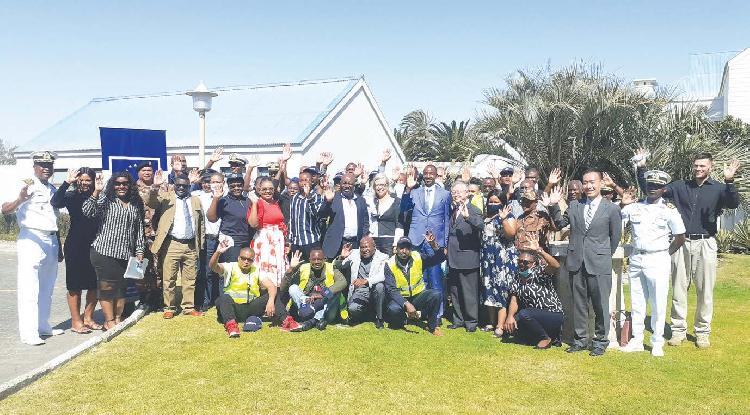Africa-Press – Namibia. FORTY trainees representing members of the private and public sector responsible for security at the port of Walvis Bay on Wednesday graduated from the latest United Nations Office on Drugs and Crime (Undoc) training at Walvis Bay.
They include officials from the Ministry of Fisheries and Marine Resources, the Namibia Ports Authority, the Namibian Police, the Namibian Navy, customs officials, Interpol, the Office of the Prosecutor General, and the Ministry of Works and Transport.
The training was conducted under the European Union (EU) Programme on Port Security and Safety of Navigation, and is funded by the EU to the tune of 16 million euros, which was divided between Angola, Comoros, Kenya, Madagascar, Mauritius, Mozambique, Seychelles, Tanzania, and Namibia.
This training forms part of a four-year programme that started in May 2020 and will run until 30 April 2024, with the goal to build maritime and port security capacity and strengthen law-enforcement agencies.
It also allows for peer-to-peer exchange and collaboration. United Nations resident coordinator Sen Pang and EU ambassador to Namibia Sinikka Antila handed over the graduates’ certificates.
Antila said the training was timely, as it coincided with the government’s strategic initiatives to improve maritime security and the expansion of the Walvis Bay port.
“The overall aim is to provide greater safety and security for the regions’ commercial vessels, their crew members, and the maritime environment they transit through.
“It also assists in establishing closer compliance with international conventions and security standards at ports. Similarly it would strengthen each country’s capacity to enforce port legal and regulatory frameworks, and allow the region to fully benefit from global maritime trade and economic growth,” Antila said.
Pang applauded the participants for their effort in valuing the training. “I can tell the team has made progress on providing a substantial programme which involves the discovery of criminal activities, detection and screening measures for illicit goods, criminal investigation, security, and evidence management.
“We see the value of this training course. Navigation plays a crucial role in the world economy.
“Sea transport contributes a lot to the economic vitality of Namibia, especially at a time when the country had been severely afflicted by the Covid-19 pandemic.
“There is no doubt that safety and security are of paramount importance to ensure the steady flow of imports and exports,” he said.
The training covers both practical and theoretical material, and focused on inter-agency collaboration and incident management, while also including a security assessment of the port itself.
Most of the training focused on the major port facility at Walvis Bay, while it was also extended to the port of Lüderitz. It is the first training programme that focuses on a multi-agency approach to port security, which is in line with the government’s strategy to address national security challenges.
For More News And Analysis About Namibia Follow Africa-Press






